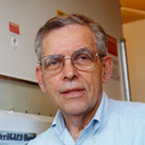
Philip Leder, MD, FAACR, a pioneering molecular biologist and geneticist and a Fellow of the AACR Academy, died February 2, 2020, at the age of 85.
Leder was born in Washington, D.C., in 1934. He earned his undergraduate and medical degrees from Harvard University.
Leder began his career at the National Institutes of Health, where he served as the director of the Laboratory for Molecular Genetics. In 1980, he became the founding chairman of the Genetics Department at Harvard Medical School. He also served as a senior researcher at the Howard Hughes Medical Institute.
Working with Marshall Nirenberg, PhD, Leder’s early research focused on the genetic code and the genetic basis of protein coding and production. He is also credited with the first attempt to genetically engineer a mouse model of cancer, initially termed “oncomouse,” and the subsequent first U.S. patent of an animal. These pioneering studies were the first in which known cancer-causing genes were experimentally injected into mice to research the resulting cancer type, laying the groundwork for the use of transgenic mouse models in cancer research.
Leder was part of the inaugural class of the Fellows of the AACR Academy in 2013. Among other career honors, he was an elected member of the National Academy of Sciences and an elected fellow of the American Association for the Advancement of Science.
Leder won the Dickson Prize in Medicine from the University
of Pittsburgh in 1981, the Albert Lasker Medical Research Award in 1987, the
U.S. National Medal of Science in 1989, and the Heineken Prize from the Royal Netherlands Academy of Arts and
Sciences in 1990.
Be the first to add a Remembrance.